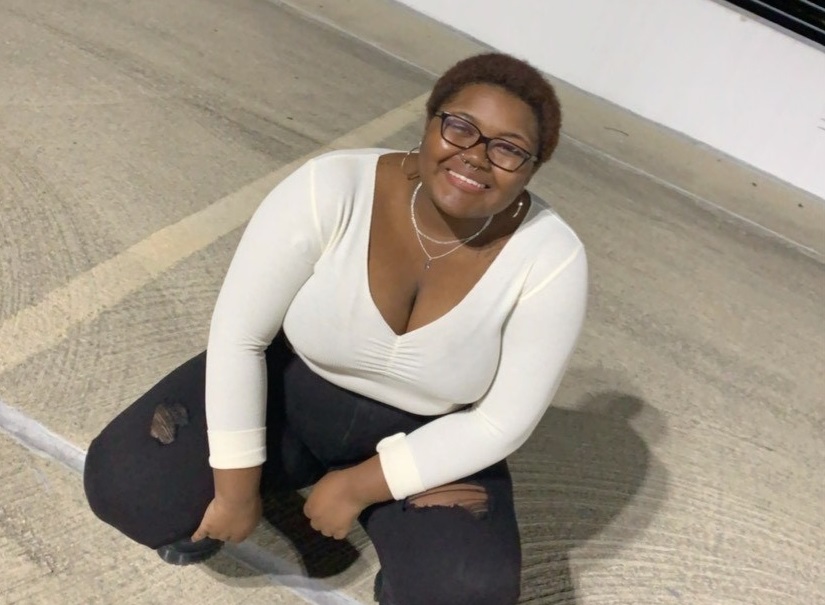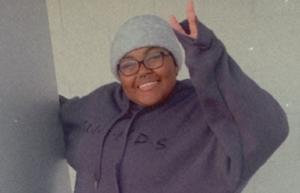T1D Voices: Reagan’s Story Is Our Story

The type 1 diabetes (T1D) community is made up of diverse individuals—we are many different “types” living with the same disease.
In recognition of Black History Month, JDRF is elevating the voices and experiences of Black T1D Champions who are contributing to JDRF’s mission to accelerate cures and improve lives.
This to show that for every member of our community, their stories are our stories.
Meet Reagan Moore, a Black, bisexual woman who has been living with T1D since she was 9 years old. She is a psychology major at Towson University in Baltimore, Maryland.
Below, Reagan, a fantastic human being and a T1D Champion to her core, shares her T1D journey (including the scariest moment of her life!), what she wishes people understood about living with T1D, her hopes for the future, and why she loves her insulin pump.
In your opinion, are there any kind of broad, but common or overlapping, perspectives or experiences of being Black, a woman, bisexual, and living with T1D?
“I have never personally been faced with discrimination or faced any adversities because of my diabetes directly. Being Black, a woman, and bisexual overlap, and I have faced discrimination—especially growing up in Georgia.”
What do you wish people better understood about you and or what it is like to be you?
“I believe that people think living with T1D is simple and easy, but there are days when my blood sugar has been high all day and my head feels like there are bricks in it. There’s a misconception that T1D is caused by obesity and eating too much sugar, and as a result of this people often think that I’m the reason I’m diabetic when in reality it has nothing to do with that.”
Your 10 year “diaversary” is going to be this February 14th. Tell us about how you felt when you were first diagnosed with T1D, and how you overcame any struggles you may have experienced.
“When I was first diagnosed with diabetes I was so scared because I had no idea what diabetes was. I was diagnosed when I was nine years old, and the only medical condition I truly knew about was cancer. I don’t think there’s enough learning going on in schools surrounding diabetes.
When I was 11 years old I went into diabetic ketoacidosis (DKA), and it was the scariest moment of my life. I would continuously go in and out of consciousness because I had brain swelling, and I honestly felt like I was dying. I have overcome that, and there are days when my blood sugar is really high all day and I’ll get really emotional, but I’ll always look to my mom, and she’ll tell me that I’m strong and that I’m just having one of my days. That helps me get through all the tough days.”
How did you first learn about JDRF? How has JDRF influenced or helped you navigate living with T1D?
“I learned about JDRF when I was first diagnosed with T1D in 2011. I learned most of the things that I know about diabetes through JDRF. I’ve been to the conventions, conferences, and JDRF walks. I love the organization because it gives diabetics the opportunity to learn without feeling judged, and it gives children with diabetes to meet others who are just like them!”
Tell us about diabetes camp. How many summers did you attend? How did it influence you growing up?
 “I loved going to Camp Little Shot. I attended for about 4 or 5 years, and it gave me the opportunity to meet others who were just like me, learn about diabetes and how to cope with it, and just have fun without worrying about other people looking at me weirdly. I remember when I first went there, and I was so scared because I didn’t know what to expect, but I felt so welcomed by everyone there. One of my dreams was to be a camp counselor at Camp Little Shot, but I moved away from Georgia. I would love to visit, though.”
“I loved going to Camp Little Shot. I attended for about 4 or 5 years, and it gave me the opportunity to meet others who were just like me, learn about diabetes and how to cope with it, and just have fun without worrying about other people looking at me weirdly. I remember when I first went there, and I was so scared because I didn’t know what to expect, but I felt so welcomed by everyone there. One of my dreams was to be a camp counselor at Camp Little Shot, but I moved away from Georgia. I would love to visit, though.”
You mentioned that you just got a new insulin pump. Have you always used a pump or other technology to help manage your T1D? If not, can you tell us about how you first felt about a pump to help manage your T1D, and how you feel about it now?
“When I was first diagnosed, I was using shots to get my insulin; however, about two years after I was diagnosed, I received my first insulin pump. While there can be complications with your pump, I wouldn’t trade it for anything in the world. My new pump has especially made my life easier because it makes it so much easier to manage my T1D.”
What would you say to people who may be hesitant to use technology to help manage their T1D?
“I would tell them to give it a try! It has helped me manage my diabetes so much easier, and I’m really glad that I have it. I also have a Dexcom G6, so I don’t have to do as many finger sticks. I used to get really insecure because I had calluses on my fingers from all of my finger pricks, but now they’re going away. I say if you can do it then go for it. It makes living with diabetes a whole lot easier.”
What advice would you have for someone who has been recently diagnosed with T1D and feels as if no one else understands what they are going through?
“I felt the exact same way when I was first diagnosed, and all I can say is to teach others about diabetes as you are learning about it. This will allow others to potentially help you when you are feeling lonely or feel like no one understands you. It may feel like your world is crashing around you, but T1D is manageable, and you can do it!”
Tell us about why mental health and debunking the stigma surrounding mental health is so important to you.
“Mental health is so important to me because it hits so close to home. Depression and anxiety runs throughout my family. In the Black community it can be hard for people to cope and understand their mental illnesses because for decades it has been discarded. Too many of our people are in prison cells when they should really be receiving the treatment and support they need in a psychiatric facility.”
You are majoring in psychology—what are your hopes for your career?
“My hopes for my career is to become a child and teen psychologist because I have always wanted to work with children and teenagers, and it’s important for children to receive therapy when they are young so it doesn’t cause problems in the future. I would love to work in a mental health or psychiatric facility after I graduate from college.”
Can you talk about the importance of self-love and what has empowered you to have it?
“I have recently learned the importance of not comparing myself to others. Everyone is different and you never know what someone else is thinking. They may be looking at you and thinking you’re beautiful or handsome while you’re looking at them wishing you looked like them. It is also important to surround yourself with those who will also lift you up. I have an amazing group of friends who reminds me of how beautiful and worthy I am on days that I can’t do it for myself, and that is so important. Self-love and acceptance is crucial for your mental health. You can never truly put love out into the world until you learn how to love yourself.”
If you had to use one word to describe your approach to life, what would it be?
“I would say that I approach life with a go-with-the-flow attitude. I try not to stress myself out about situations that are far out of my control because that will simply cause unneeded anxiety in my life. I just roll with the punches and try to enjoy life one day at a time.”